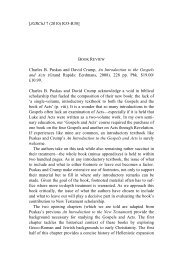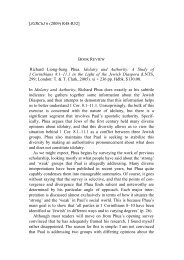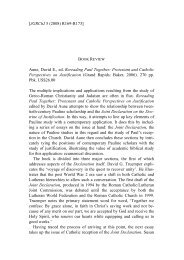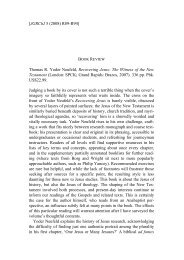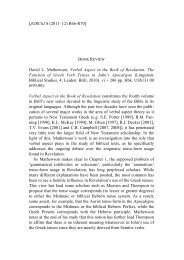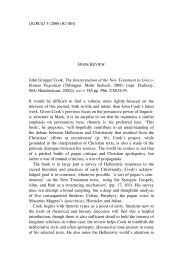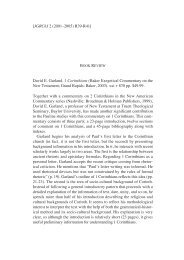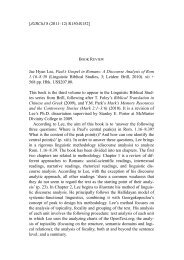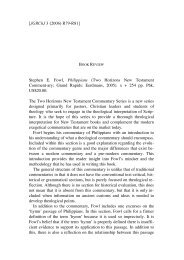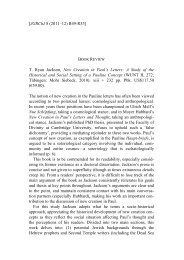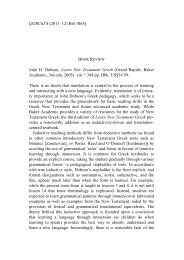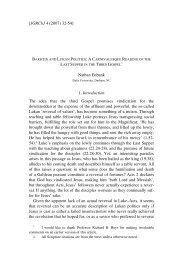The Politics of Ephesians and the Empire - Journal of Greco-Roman ...
The Politics of Ephesians and the Empire - Journal of Greco-Roman ...
The Politics of Ephesians and the Empire - Journal of Greco-Roman ...
You also want an ePaper? Increase the reach of your titles
YUMPU automatically turns print PDFs into web optimized ePapers that Google loves.
Gupta & Long <strong>Politics</strong> <strong>of</strong> <strong>Ephesians</strong> <strong>and</strong> <strong>the</strong> <strong>Empire</strong> 127<br />
research on <strong>the</strong> Haustafeln that places <strong>the</strong>m within ancient discussions<br />
<strong>of</strong> oi0konomi/a (as discussed by, e.g., Aristotle). 54 Concerning <strong>the</strong> purpose<br />
<strong>of</strong> <strong>the</strong>se codes, David Balch has argued, especially in <strong>the</strong> case <strong>of</strong> 1 Pet.<br />
2.11–3.12, that some early church leaders took an interest in conforming<br />
to <strong>the</strong> household norms <strong>of</strong> society in order to mitigate conflict. 55 <strong>The</strong><br />
political relevance <strong>of</strong> adopting this view <strong>of</strong> <strong>the</strong> HCs is demonstrated by<br />
John Dominic Crossan <strong>and</strong> Jonathan Reed:<br />
What is most striking about <strong>the</strong>se texts [HCs in Colossians <strong>and</strong> <strong>Ephesians</strong>]…<br />
is that, if you bracket <strong>the</strong>ir explicit Christian motivation, <strong>the</strong>y emphasize<br />
general family values that would be quite acceptable across contemporary<br />
<strong>Roman</strong> social <strong>the</strong>ory <strong>and</strong> practice. Augustus, were he still alive, would have<br />
been extremely pleased. It seems most likely, <strong>the</strong>refore, that <strong>the</strong>ir purpose<br />
was to insist that Christian families were not at all socially subversive, but<br />
were as good as, if not better than, <strong>the</strong> best <strong>of</strong> those around <strong>the</strong>m. 56<br />
This kind <strong>of</strong> perspective has led many to consider <strong>Ephesians</strong> non-<br />
Pauline in <strong>the</strong>ology <strong>and</strong> sociological perspective since it is not in keeping<br />
with <strong>the</strong> radical egalitarianism found in passages such as Gal. 3.28. 57 It<br />
is unfathomable that <strong>the</strong> HCs are a working out <strong>of</strong> Paul’s <strong>the</strong>ology in<br />
any way. Why did <strong>the</strong> early Christians not promote <strong>the</strong> emancipation <strong>of</strong><br />
slaves <strong>and</strong> <strong>the</strong> equality <strong>of</strong> women <strong>and</strong> men? James D.G. Dunn makes<br />
<strong>the</strong> excellent response to this concern that <strong>the</strong> direction <strong>the</strong> early church<br />
took may seem like a ‘spineless conformity to <strong>the</strong> world’, but that is only<br />
apparent to ‘us’ in our culture <strong>and</strong> in our time: ‘Hindsight <strong>and</strong> <strong>the</strong> superior<br />
wisdom <strong>of</strong> <strong>the</strong> post-Enlightenment European [or American] is not a very<br />
good base for a criticism which attempts to censure first-century ethics’. 58<br />
When addressing <strong>the</strong> primary concern <strong>of</strong> this article, <strong>Ephesians</strong><br />
appears to be accommodationistic in view <strong>of</strong> <strong>the</strong> HC. But, as we have<br />
54. See D. Balch, ‘<strong>The</strong> Household Codes’, in D.E. Aune (ed.), <strong>Greco</strong>-<strong>Roman</strong><br />
Literature <strong>and</strong> <strong>the</strong> New Testament: Selected Forms <strong>and</strong> Genres (Atlanta: Scholars<br />
Press, 1988), pp. 25-50.<br />
55. See D. Balch, Let Wives Be Submissive: <strong>The</strong> Domestic Code in 1 Peter<br />
(SBLMS, 26; Chico, CA: Scholars Press, 1981).<br />
56. Crossan <strong>and</strong> Reed, In Search <strong>of</strong> Paul, p. 118.<br />
57. So L.S. Cahill, ‘Gender <strong>and</strong> Christian Ethics’, in R. Gill (ed.), <strong>The</strong> Cambridge<br />
Companion to Christian Ethics (Cambridge: Cambridge University Press, 2001),<br />
pp. 112-24 (117), who argues that <strong>the</strong> patriarchalism <strong>of</strong> <strong>the</strong> HCs is ‘contradicted by<br />
St Paul himself’.<br />
58. J.D.G. Dunn, ‘<strong>The</strong> Household Rules in <strong>the</strong> New Testament’, in S.C. Barton<br />
(ed.), <strong>The</strong> Family in <strong>The</strong>ological Perspective (Edinburgh: T. & T. Clark, 1996),<br />
pp. 43-64 (60).



